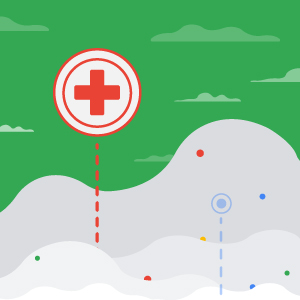It’s been six years since U.S. healthcare providers were required to integrate medical records into electronic systems under the American Recovery and Reinvestment Act. Since then, newer mandates have continued to encourage digital data sharing and interoperability within healthcare organizations. A natural next step in the digitization of healthcare records is storing that data in the cloud, where it can be securely accessed and updated by healthcare teams. Additionally, when paired with cutting-edge artificial intelligence and machine learning technologies, cloud computing can offer data analysis that facilitates breakthroughs in medical research and patient care.
Cloud computing isn’t just for hospitals and private clinics, though. Federal healthcare agencies can reap similar benefits from switching to the cloud. These organizations manage a large amount of disparate data—imaging data, medical records data, research data—and it can be unstructured and spread across different systems.

When agencies want to consolidate that data into a single place, the best solution is in cloud storage technologies because of scalability, potential cost savings and the ability to leverage other cloud services like machine learning and artificial intelligence.
Here are three ways cloud computing can make a difference within federal healthcare agencies.
The Cloud Can Lead to Cost Savings
In June 2019 the White House updated its federal cloud computing strategy for the first time in seven years to drive cloud adoption among federal agencies. According to the strategy’s website, the new push embraces best practices from both the federal government and the private sector to ensure agencies can leverage cloud computing to better serve agency mission, drive improved citizen services, and increase cybersecurity.
Many federal agencies already leverage some sort of cloud technology for day-to-day operations such as email, shared calendars, or document storage. Beyond leveraging the cloud for day-to-day productivity tools, federal agencies can derive even more value from the cloud by adopting cloud-based tools for compute resources, data harmonization, analytics, and machine learning
One benefit of switching operations to the cloud is cost savings. Many federal agencies start to consider cloud storage when it becomes time to refresh the data center infrastructure or servers that handle their digital operations. It becomes a choice between investing in more infrastructure or reducing their data center footprint and using the cloud.
Once federal healthcare organizations adopt the cloud, there is less need for maintaining their own data centers, so they can spend more time focusing on research and patients.
Addressing Data Interoperability and Sensitive Data Requirements
Data interoperability is an issue plaguing the healthcare industry, including federal healthcare. Healthcare data is often messy due to being stored in multiple disparate systems and in different formats. It’s because of this messiness that agencies are unable to get the full value from their data.
Healthcare organizations are working to resolve this issue by consolidating and harmonizing their data through advanced cloud storage technologies. They then leverage open source tools or managed services to conduct translation and standardize on current data standards. One popular international healthcare data standard is the Fast Healthcare Interoperability Resource (FHIR), which aims to transcend the document-based healthcare environment and expand health management, patient engagement, and intelligent clinical support.
Once an organization’s data is standardized on a format like FHIR, that’s where it can really bring value to patients—doctors and researchers can work with a larger data set and make smarter decisions.
Handling medical records has always posed its own challenges due to patient privacy laws and the sensitive nature of the data. The processes involved in transitioning such data to the cloud include ways to encrypt and de-identify the data. A common solution includes Data Loss Prevention (DLP) that leverages machine learning for the tokenization or redaction of sensitive data. This not only helps organizations with HIPAA compliance and data protection, but speeds up the redaction process through automation.
Access to Machine Learning and Artificial Intelligence
The ability to organize and secure medical data within a cloud platform furthers the ultimate goal at the core of the medical record mandate implemented six years ago: improving care, engaging patients, and securing patient medical information through the meaningful use of electronic health records. But cloud-based operations also position federal healthcare agencies to take advantage of machine learning and artificial intelligence capabilities, which are already making an impact in healthcare.
There are several recent examples of advancements fueled by cloud-based data analytics, including the ability to predict a patient’s diagnosis. For example, an organization created a machine learning model that can scan a patient’s x-ray and predict whether they have viral or bacterial pneumonia with a percentage of certainty.
Other healthcare organizations are using Natural Language Processing (NLP) to automate content classification, and analyze the sentiment and syntax of healthcare provider reports to identify gaps in patient care. Additionally, there are cancer research organizations leveraging machine learning to analyze images 12 times faster than before.
The adoption of artificial intelligence and machine learning in healthcare has increased velocity when it comes to revolutionary breakthroughs by detecting patterns and predicting clinical outcomes in patient data. Federal healthcare agencies are able to find breakthroughs in medicine a lot more quickly while taking advantage of cost savings, and these machine learning capabilities carried out in the cloud environment will only grow in the years to come.
Check out our Archived Webinar on Google Cloud Healthcare. Also, learn more with these additional resources about Google’s Healthcare API, Cloud Data Loss Prevention and Cloud Natural Language Processing.






